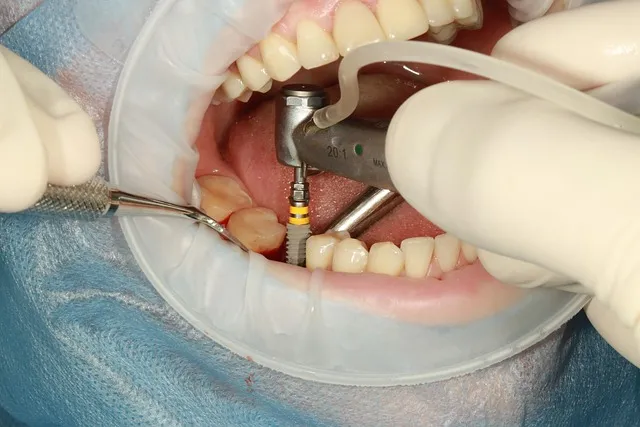Do you know that one missing tooth can do more than affect your smile? They can hinder your ability to chew and speak, and even lower your confidence. But with tooth replacement procedures like dental bridges and dental implants, you can replace those missing teeth. Though both restore smiles, they work differently and are used for different purposes. So, how do you choose between dental implants and bridges?
If you are looking for a Dentist in Guelph, explore this guide to understand the best option for you. By understanding the difference between these two treatments, you can make an informed decision.
Understanding Dental Implants and Dental Bridges
What is a Dental Implant?
A dental implant is basically a small titanium device that is surgically placed in the jawbone to replace a missing tooth. After it gets healed, a crown (a naturally looking tooth) is attached to the outer side of the treated teeth. These implants are permanent, long-lasting, and appear like real teeth. As they merge with the jawbone, they help alleviate the risk of bone loss and promote a healthy jaw.
What is a Dental Bridge?
A dental bridge is a permanent dental restoration that replaces one or more missing teeth by filling the gap left by them. It depends on the healthy teeth present on each side of the gap to give support to the new tooth. Unlike dental implants, dental bridges do not fuse with the jawbone. Instead of this, the teeth adjacent to the missing ones are reshaped and filled using an artificial crown, which helps keep the new tooth in place.
Key Differences: Dental Implants vs. Dental Bridges
Now that you understand the basics about these two dental treatments, here is how they matter in different situations.
1. Number of Missing Teeth
If only one tooth is missing, both dental implants and bridges can work effectively.
However, if multiple teeth are missing in a row, dental bridges are a quicker option to place.
Implants can also help with larger replacements, such as dentures and implant-supported bridges.
2. Bone Health & Jaw Support
As dental implants penetrate the jawbone, they need a strong base to work. If the jawbone is thin or weak, the healthcare providers may recommend a bone graft before undergoing surgery.
On the other hand, as dental bridges do not go into the bone, they are more suitable if the jawbone has already diminished or you want a less invasive procedure.
Comparatively, dental implants aids in maintaining bone density, which help protect your bite and face shape with each passing time.
3. Treatment Timing
The procedure of dental bridges is quicker than bridges- typically, the process is completed in 2 visits within a few weeks.
On the contrary, dental bridges may take a longer time, usually several months, to allow proper healing of the bone around the implant before placing the crown. But its results are long-lasting compared to implants.
4. Durability and Longevity
Once the dental implants are placed properly, they can last for a lifetime with effective care afterwards.
Dental bridges, on the other hand, generally last for about 10-15 years. The dental professionals may ask to replace them after some time, particularly if the nearby supporting teeth have some issues.
5. Effect on Surrounding, Healthy Teeth
For placing dental bridges, the nearby healthy teeth on each side of the gap need to be reshaped. This is done for proper fitting of the crown that can help hold the bridge.
As dental implants do not touch nearby teeth, there is no excess stress placed on these teeth. This aids in preserving the overall dental health.
6. Oral Hygiene
Dental implants are much easier to clean than bridges. You just have to brush and floss them similarly to your natural teeth.
However, dental bridges require extra care, like special flossing or cleaning under the false tooth with tools to prevent the risk of gum disease and decay.
7. Cost & Insurance Coverage
Dental implants can be expensive, especially if there is a requirement for extra work, such as the placement of multiple implants or bone grafting.
Comparatively, dental bridges cost less initially and are frequently covered by renowned insurance companies. But, you may need to replace them, which can add to the cost.
How to Make the Right Choice?
Every person has different dental health. So, to choose between dental implants and bridges, ask yourself these questions to determine the right choice:
Do I want a permanent solution?
Am I fine undergoing a surgery and comfortable with the recovery time?
Are my gums and jaw both healthy?
Do I want my natural teeth untouched?
What will my insurance assist in paying for?
Answering all these questions for yourself will help you understand your dental needs and make the best choice accordingly.
Why Trusted Care Matters?
Both dental implants and dental bridges are effective, safe, and used across different areas of Canada. But the key is to choose and work with the reliable dental team that puts all your needs first.
At Uptown Guelph Dental, the comfort and confidence of each patient are the crucial points in every decision. We take ample time to understand the patient's needs, clearly explain all the options, and guide them throughout their treatment journey. No one will ever feel unsure or rushed. Instead of this, all patients will be properly informed about what to expect and how to take care of the new teeth.
Final Thoughts
How to choose between dental implants and bridges is not just about considering the speed and cost of the treatment, but about overall dental health, lifestyle, and future goals. Both treatment options have exceptional benefits, and the suitable one will depend on your personal dental needs.
When you choose and work with an experienced and certified dental professional, you do not just get fixed a new tooth/teeth, you also get honest expert advice and a smile that feels natural, like you once had.
लेखक





